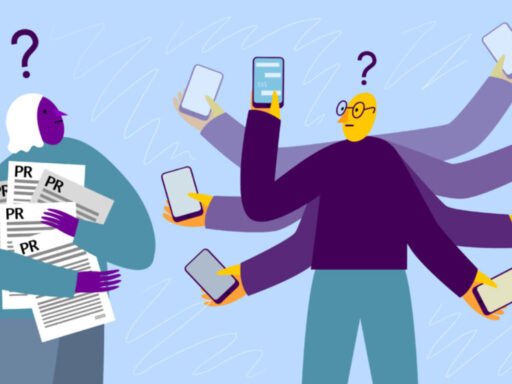Today, people move fast online. Business messages can feel cold if they are not personal. Generic emails make people feel distant.
Making messages personal builds stronger ties. It also helps you stand out from others. A personal touch shows care and effort.
Personal emails get more attention. Did you know that personalized emails can increase engagement rates by up to 26%? This proves that custom messages work better than templates.
Here are eight simple tips to make your business messages personal. These tips can help you connect better with clients, partners, and coworkers.
- Use the Recipient’s Name
Using someone’s name makes the message feel personal. It shows you know who they are. A name makes the email stand out from bulk messages.
Always check the spelling before you send. A wrong name can feel careless or even rude. Taking a minute to confirm details builds trust.
Using a name also creates warmth in your message. People feel seen and valued when addressed directly. This small step can improve how they respond.
You can use their name in the greeting, the subject line, or even inside the email. Just don’t overdo it, or it may feel forced. A natural use of the name feels friendly and professional.
- Reference Past Conversations
Bringing up past talks makes your message stronger. It shows you listen and care about details. This makes the other person feel valued.
You can mention a project, a question, or even a challenge they shared. This creates a smooth flow between old and new conversations. It also reminds them that you remember what matters to them.
Referencing past talks builds trust over time. It shows you are not sending random notes. Instead, you are adding to an ongoing relationship.
You can use this in emails, calls, or meetings. Even a small detail, like asking about progress, makes a big impact. It shows you are invested in the person, not just the task.
- Tailor Your Tone
Your tone sets the mood of your message. Matching it to the person shows respect. It helps your message sound natural and clear.
Use a formal tone with corporate partners or new contacts. Keep sentences clear and polite. This builds trust and shows professionalism.
With creative clients or close partners, a lighter tone may work better. Adding friendly words or a relaxed style makes the message feel warm. It shows you know the person well.
Think about the situation, too. A serious issue needs a careful tone. A quick thank-you can be more casual. Adapting to context keeps your message balanced.
Changing tone does not mean changing who you are. It means showing awareness of the other person. This makes your message easier to understand and more effective.
- Include Relevant Details
Adding details makes your message stronger. It shows you know the person and their world. This makes the message feel personal, not generic.
You can share facts, stats, or news about their industry. These details prove you are informed. They also give value to your message.
Personal touches help too. Mention a conference they joined or an award they received. Even a small note shows you are paying attention.
Details also spark conversation. They give the reader something to reply to. This can keep the exchange active and engaging.
Be careful not to overload with too much info. Pick what matters most to the recipient. Relevant details make your message useful and respectful of their time.
- Use Segmented Lists
Not all people are the same. Splitting your audience into groups makes your messages stronger. It helps you send the right message to the right person.
You can group people by age, location, or interests. You can also sort by past purchases or how often they engage. Each group gets messages that fit their needs.
This saves time and avoids sending random emails. Clients feel like the message was made for them. This builds trust and makes them more likely to respond.
Segmented lists also improve results. Open rates and clicks often go up with targeted emails. People are more willing to read when the content feels useful.
Even small lists can be segmented. Start with simple groups, like new clients versus long-term ones. Over time, you can add more details to refine your strategy.
- Stick to a Schedule
Sending messages on a set schedule builds trust. It shows you care about staying in touch. Clients know when to expect your updates.
A monthly newsletter can share news or tips. A weekly check-in can keep projects on track. Even a yearly follow-up keeps the relationship alive.
Consistency makes you more reliable. People see you as organized and professional. They also feel valued because you remember them often.
A schedule also keeps your business fresh in their mind. Regular updates remind them of your work and services. This can lead to repeat business and referrals.
- Offer Value
Every message should give something useful. People are more likely to read if they gain something. Value keeps them engaged and interested.
You can share tips, tools, or insights. Free guides, templates, or checklists work well. Even small resources can make a big impact.
Adding value shows you care about their needs. It also shows you know your field. This builds respect and positions you as a trusted expert.
Value does not always mean free items. It can be advice, news, or industry updates. Anything that saves time or solves a problem is useful.
- Follow Up Promptly
Sending a quick follow-up shows you care. It proves you are serious about the relationship. It also keeps the conversation alive after the first contact.
Follow up after a meeting, a call, or an event. This helps repeat the key points discussed. It also gives space to answer questions or share extra resources.
You can add value in a follow-up. For example, share a free cover letter template, a guide, or a useful article. Small tools like this make you stand out.
Fast follow-ups build trust. Waiting too long can make you seem uninterested. A short, polite note sent quickly works best.
Connecting Through Personalization
Today, many messages feel rushed and cold. Taking time to make them personal can build stronger connections.
Using the tips above makes your messages better. It helps you stand out and leave a good impression.
Personal notes do more than raise engagement. They help build relationships that last. Start small today and see the difference in your business.
For more related topics, check out the rest of our blog!





